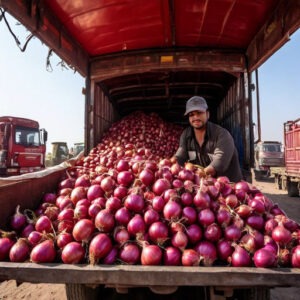The Government of India has recently extended the prohibition on onion exports while permitting limited exports to neighboring countries. This decision comes in response to domestic and global supply concerns, aiming to ensure sufficient onion availability in the domestic market. This article explores the details of the government’s directive for onion procurement, the significance of Rabi onions, previous procurements, export policy measures, and the extension of export prohibition, among other related aspects.
Government’s Directive for Onion Export
To address the supply concerns, the Government has directed the National Cooperative Consumers’ Federation (NCCF) and the National Agricultural Cooperative Marketing Federation of India (NAFED) to procure 5 lakh tonnes of onions directly from farmers. This initiative aims to fulfill the buffer requirement as the Rabi-2024 harvest arrives in the market. The procurement process includes pre-registering onion farmers and ensuring direct payments to their bank accounts through the Direct Benefit Transfer system.
Significance of Rabi Onion
Rabi onions hold significant importance in India’s onion availability, accounting for 72-75% of the annual production. These onions have a better shelf life compared to Kharif onions, allowing for storage and supply until November-December, ensuring year-round availability.
Previous Procurements and Farmer Benefits
During the 2023-24 period, the Department of Consumer Affairs, through NAFED and NCCF, procured approximately 6.4 lakh metric tonnes (LMT) of onions for buffer stocking and intervention purposes. These procurements have provided onion farmers with remunerative prices throughout the year, ensuring stability in their income.
Retail Sale Interventions
Retail sale interventions were implemented through outlets and mobile vans operated by NCCF, NAFED, Kendriya Bhandar, and other state-controlled cooperatives. Onions were offered at subsidized prices of Rs. 25 per kg, stabilizing retail prices without adversely impacting farmer returns.
Export Policy Measures
To regulate onion exports during the fiscal year 2023-24, the Government imposed a 40% duty on exports from August 19, 2023, and set a Minimum Export Price (MEP) of USD 800 per metric tonne from October 29, 2023. It also prohibited exports from December 8, 2023, to ensure ample availability for domestic consumers.
Extension of Export Prohibition
The decision to extend the prohibition on onion exports reflects the Government’s commitment to managing domestic availability amidst prevailing international prices and global supply concerns.
Limited Exports to Neighboring Countries
However, exports to neighboring countries, which rely on India for their onion requirements, have been permitted. The Government has authorized exports to Bhutan (550 MT), Bahrain (3,000 MT), Mauritius (1,200 MT), Bangladesh (50,000 MT), and the UAE (14,400 MT).

Authorized Export Quantities
The authorized export quantities to these countries have been carefully determined to balance domestic needs with international commitments, ensuring that domestic availability is not compromised.
Benefits of Export Allowance
Allowing limited exports to neighboring countries benefits Indian farmers by providing them with additional market opportunities while also fulfilling the international obligations.
Conclusion
In conclusion, the Government’s decision to extend the prohibition on onion exports while allowing limited exports to neighboring countries demonstrates its commitment to managing domestic availability. This approach aims to address both domestic and global supply concerns, ensuring a balance between domestic consumption and international commitments.
Click Here For More Latest News Articles
FAQs
- What is the significance of Rabi onions in India? Rabi onions account for 72-75% of the annual production in India and have a better shelf life compared to Kharif onions, ensuring year-round availability.
- How have previous onion procurements benefited farmers? Previous procurements have provided onion farmers with remunerative prices throughout the year, ensuring stability in their income.
- What were the export policy measures implemented during the fiscal year 2023-24? The export policy measures included imposing a 40% duty on exports, setting a Minimum Export Price (MEP) of USD 800 per metric tonne, and prohibiting exports during certain periods to ensure ample availability for domestic consumers.
- Why has the Government extended the prohibition on onion exports? The extension aims to manage domestic availability amidst prevailing international prices and global supply concerns.
- What are the benefits of allowing limited exports to neighboring countries? Allowing limited exports benefits Indian farmers by providing them with additional market opportunities while fulfilling international obligations.










